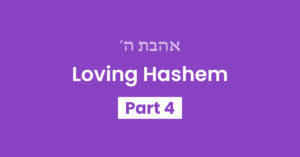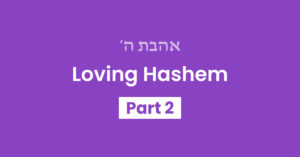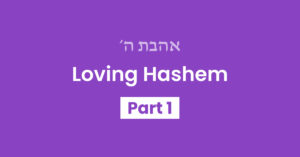We have been focusing this month on how to fulfill the mitzvah of Ahavas Hashem. First, we discussed how the more we recognize all the gifts Hashem gives us, the more we will love Him. This is especially effective if we can remember that Hashem doesn’t just give and then leave us to fend for ourselves; rather, by giving us these gifts, He intends to forge an everlasting relationship and deep, loving bond with each of us personally.
Next, we explained how we can access an even deeper, natural, inborn love of Hashem if we can remember that He is the Source of our existence every moment. Like a child who loves his parents simply because they gave birth to him, we, too, can access a deeper love of Hashem by remembering that He is the One who brought us into existence. Focusing on this truth will help us feel a constant connection to Hashem and engender feelings of love and infinite closeness.
Aside from these points, there is yet another thing we can do to help us feel love of Hashem. And that is to give to Him. The more we give to Hashem, the more we will love Him. Let’s explore how this works.
A Lifetime of Giving
You may have heard people say a classic statement that an engaged couple thinks they are in love, but it is nothing compared to the love that a couple can develop after 50, 60 or 80 years of marriage – after giving to each other day after day, year after year.
It’s one thing to say “I love you,” but it’s a whole extra level of love if someone can also express that love in their actions. Every act of giving to each other – whether making the beds, preparing food, smiling, listening to each other patiently, or offerring a kind word – forges a deeper and deeper bond of love.
It is for this reason that the Hebrew word “Ahavah” (love) contains the root “hav” which means “give.”1. The way to develop a deep love of any person – or love of Hashem – is by giving to them.
The way to develop love is by giving.
Giving to Hashem
When it comes to Hashem, what does it mean to give to Him? Hashem owns everything in the entire world. He doesn’t need our money, our food, or our help. So what does it mean to give to Him?
The passuk in Shema tells us the answer: “V’Ohavta Es Hashem Elokecha Bichol Levavcha U’v’chol Nafshecha U’v’chol Me’odecha – You should love Hashem with all your hearts, soul, and money.”2 The easiest one to understand here is money. We can “give” Hashem our money by using our money for mitzvos, such as giving tzeddakah, supporting Torah learning, supporting widows and orphans, and spending our money l’kovod Shabbos.
Next, we can understand the word “Nafshecha” (your soul). Rashi explains this means that we should be prepared even to give up our lives al kiddush Hashem, as Rabbi Akiva did when the Romans killed him for the “crime” of teaching Torah3.
Finally, what does it mean to love Hashem with our “hearts”? Rashi explains: We should love Hashem with “both our yetzer tov, and our yetzer hara.” What does this mean?
Rav Shimshon Rephael Hirsch explains that “loving Hashem with our Yetzer Tov” means choosing to listento our Yetzer Tov when it wants us to do good… even if we just don’t feel like doing the mitzvah right now. And “loving Hashem with your Yetzer Har”a means choosing to ignore your Yetzer Hara when it tells us to do bad things… even if we are very tempted to do the wrong thing.
In each of these scenarios, we are “giving” to Hashem because we are “giving up” our own will for the sake of doing Hashem’s will. I would rather spend my money on remodeling my kitchen, but I will choose to use my money instead for supporting Torah. I would rather lie in bed for another half hour, but I will choose to give up my sleep for Hashem by getting up in time for Shacharis. I would rather eat this milchik ice cream after my fleishik meal, but I will instead give up that pleasurable taste for Hashem by refraining from eating it.
We are “giving up” our own will for the sake of doing Hashem’s will.
Getting More Personal
While each act of giving forges a stronger and stronger bond of love between us and Hashem, there are cetain types of giving that are more powerful than others.
What would be more meaningful to you: If your friend gave you a $2 gift, or if they woke up at 3:00 am to pick you up from the airport?
Clearly, waking up at 3 am on your behalf would be a much more meaningful “gift.” Why? Because your friend’s sleep is a lot more precious to them than their $2. It’s a lot easier to give up $2 than to wake up at 3 am and drive to the airport.
The more precious or personal something is to you, the more it creates love when you are able to give that up for someone else.
We generate the most love when we give others our most personal or precious things.
Before Avraham went to do Akeidas Yitzchak, Hashem said, “Take your son, your only son, the son who you love – and bring him up as a korban to Me.”4 Why did Hashem describe Yitzchak in so many different ways? The Malbim5 explains that Hashem was trying to make Yitzchak more and more beloved and precious in the eyes of Avraham, so that when Avraham would agree to bring him up as a korban, it would be an even greater act of love for Hashem. Because the more that we give up things that are precious to us for the sake of Hashem, the more it shows how much we love Him. Ultimately, for this unbelievable acts of love that Avraham did at the Akeidah, he merited to be called “Avraham Ohavai – the one who loves Me [Hashem].”
This week, let’s try to find ways we can “give” to Hashem. The more we can manage to give Hashem those things that are most precious to us and the hardest to give up, the more we can develop a deeper and deeper bond of love with Hashem and fulfill the mitzvah of Ahavas Hashem.
Sources: [1] Rav Shimshon Rephael Hirsch; [2] Devarim 6:5; [3] Brachos 61b; [4] Bereishis 22:2; [5] Malbim, ibid.
Your Challenge
Once a day, find a way to give something up for Hashem.
FOR EXAMPLE:
- Give up your sleep by waking up early on time to daven, at a time when it’s hard for you.
- Give up your money to tzeddakah, to support limud Torah, or l’kavod Shabbos.
- Give up the temptation to say a juicy piece of lashon hara.
- Give up eating an extra piece of cake so that you will be healthier and stronger to serve Hashem.
Torah Questions
- The Midrash teaches (Bereishis Rabbah 55:8) that sometimes, a person’s love can cause them to do strange things. Which person in the Torah did something out-of-the-ordinary because he loved Hashem so much? What did he do? (See Rashi on Bereishis 22:3)
- Which person in the Torah did the same thing, but stemming from the opposite motivation – stemming from his hatred for the Jewish people? (See Badmidbar 22)
- According to Devarim 30:20, what will happen if we love Hashem, listen to Him, and cling to Him?
- In the first few pesukim of Malachi, the Navi says that Hashem loves _____ but hates _____?
- In Maariv, we say the bracha of “Oheiv Amo Yisroel – Hashem loves His nation, Israel.” What do we say right after this bracha?
Questions to Ponder
- In the paragraph of “Vi’Ohavta” in Shema, it says that we should love Hashem with all our hearts. One of Rashi’s explanations is that this means “your heart should not be divided on Hashem.” What do you think this means?
- It says in the Sefer Haksav V’Hakabbalah that there are 2 types of Ahavas Hashem: limited love, and boundless love. What do you think this means? Can you think of examples of each type?
- The Orchos Tzaddikim writes that the more you know someone, the more you are able to love them. How do you think this would apply to loving Hashem? What can we do to “get to know” Hashem better? Have you ever learned something about Hashem that made you love (or fear) Him more?





